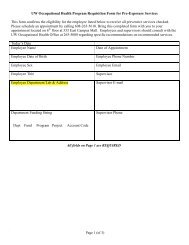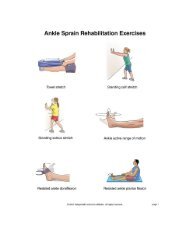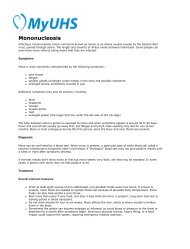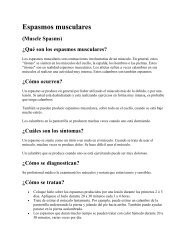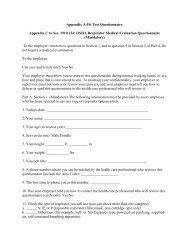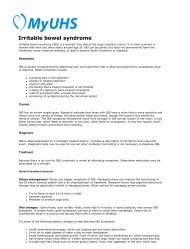Upper respiratory infections
Upper respiratory infections
Upper respiratory infections
Create successful ePaper yourself
Turn your PDF publications into a flip-book with our unique Google optimized e-Paper software.
<strong>Upper</strong> <strong>respiratory</strong> <strong>infections</strong><br />
An upper <strong>respiratory</strong> infection (URI) results from a viral infection that causes inflammation of the nose and<br />
throat. URIs usually last 10 to 14 days but can last considerably longer.<br />
Symptoms<br />
There are over 200 viruses that can cause URIs with one or more of the following symptoms:<br />
● runny nose<br />
● stuffy nose<br />
● mucus in the throat<br />
● scratchy or sore throat<br />
● fatigue and weakness<br />
● cough, with or without mucus<br />
● fever below 101ºF<br />
● muscle and body aches<br />
● mild headache<br />
Treatment<br />
Because URIs are viral and antibiotics don’t work against viruses, treatment focuses on feeling better until the<br />
body eliminates the virus. General treatment measures or nonprescription medications may help relieve URI<br />
symptoms. Prescription medications are rarely necessary.<br />
General treatment measures<br />
●<br />
●<br />
●<br />
●<br />
●<br />
●<br />
Drink at least eight ounces of noncaffeinated, nonalcoholic fluids every two hours to help soothe the<br />
throat and relieve nasal congestion. Drink more if a fever is present.<br />
Eat a well-balanced diet, including fruits, vegetables, and grains.<br />
Take it easy. Modify exercise routines, if necessary, to avoid excessive weakness and fatigue.<br />
Don’t smoke. Smoking is drying and irritates the nose and throat.<br />
Don’t drink alcohol. Alcohol makes it harder for the body to fight off disease and interacts with many<br />
medications.<br />
Don’t take antibiotics that are "left-over," old, or someone else’s.<br />
Nonprescription medication<br />
If a condition such as high blood pressure or kidney disease is present, or if pregnancy is suspected, consult a<br />
clinician before taking any medication. Carefully follow any instructions that accompany nonprescription<br />
medication. Clinicians and pharmacists can provide specific instructions regarding dosage and any possible<br />
side effects of medications.<br />
Avoid multi-symptom cold remedies. Such products are usually expensive, contain unneeded medication, or<br />
the individual ingredient doses may be too low to be effective.<br />
All of the following products may be purchased at any pharmacy. It is safe to take any of these with each<br />
other, but check with a pharmacist if in doubt.<br />
Runny nose/congestion<br />
●<br />
●<br />
●<br />
●<br />
Decongestants: Phenylephrine or pseudoephedrine (must be purchased directly from the pharmacist)<br />
may relieve runny nose and congestion. Pseudoephedrine can cause sleeplessness and decreased<br />
appetite. Please note: if you are taking MAOI inhibitor medication, you should not use decongestants.<br />
Nasal irrigation: Using an irrigation tool, such as a neti pot and saline solution (e.g., SinuCleanse,<br />
Sinus Rinse) removes excess secretions from sinuses and makes it easier to breathe through the nose.<br />
Humidification: A cool mist vaporizer (not steam, which can burn) or a hot shower may moisten nasal<br />
passages and clear mucus. Vaporizers are a good, low-cost investment for dry winters but must be<br />
kept clean and free of mold.<br />
Nasal sprays: Saltwater or saline nasal sprays may ease nasal congestion and make mucus less thick.
●<br />
Do not use medicated over-the-counter nose sprays (such as Afrin) for more than three days.<br />
Excessive use can cause congestion.<br />
Cough<br />
A cough is a protective reflex and usually is not harmful. Research has shown that most medications<br />
specifically designed for coughs (e.g., dextromethorphan) don’t work.<br />
The following are effective alternatives to cough suppressant medication.<br />
●<br />
●<br />
●<br />
●<br />
Naproxen: Some studies have found that the nonsteroidal anti-inflammatory drug, naproxen, can<br />
decrease coughing associated with URI. For a cough, take 400 to 500 mg initially; then 200 to 500 mg<br />
three times a day for five days. Because naproxen is a pain reliever, this will also help with aches and<br />
pains.<br />
Antihistamines: Studies have shown that first-generation (older) antihistamines such as<br />
diphenhydramine, chlorpheniramine, and dexbrompheniramine are effective at suppressing coughs<br />
resulting from URIs. They may also cause significant drowsiness. Newer, non-drowsy antihistamines<br />
are ineffective in treating cough.<br />
Guaifenesin alters mucus production and may help lessen coughing.<br />
Hot or warm liquids, such as warm water or tea with honey and lemon, can soothe throat irritation and<br />
prevent coughing.<br />
Sore throat<br />
●<br />
●<br />
Phenol: lozenges and sprays containing phenol are particularly effective pain relievers for sore throats.<br />
Gargling with warm saltwater (one teaspoon salt in one cup of hot water) may help ease the pain.<br />
Fever/pain<br />
●<br />
Acetaminophen, aspirin, and ibuprofen: Use according to label directions for pain and/or fever relief. If<br />
symptoms are severe, alternate acetaminophen (650 mg) and ibuprofen (400 mg) every two hours<br />
for pain or fever relief. Avoid taking ibuprofen at the same time as similar medications, such as<br />
naproxen. If under the age of 19, do not use aspirin, as it can contribute to Reye’s syndrome—a lifethreatening<br />
illness of the brain and liver that usually follows a viral infection in children or teenagers.<br />
Prevention<br />
●<br />
●<br />
●<br />
Wash hands frequently and keep them away from the face. URIs generally spread when infected<br />
droplets from coughing or sneezing land on objects. When a person touches these objects and then<br />
their mouth, nose, or eyes, infection can result.<br />
Use disposable tissues rather than cloth handkerchiefs to prevent re-infection.<br />
Eat healthily. The benefits of consuming large amounts of vitamin C to prevent URIs are unknown.<br />
When to seek care<br />
If symptoms worsen or persist for more than 10 to 14 days after trying the self-care measures listed above,<br />
contact a clinician. See a clinician as soon as possible if any of the following occur:<br />
●<br />
●<br />
●<br />
●<br />
●<br />
●<br />
temperature greater than 101ºF for more than two days<br />
marked pain in the ears, face, or chest<br />
wheezing or shortness of breath<br />
persistent and severe sore throat, particularly if unable to swallow or open the mouth<br />
severe headache or stiff neck<br />
skin rashes or bruised skin<br />
[HU445: 06/09]


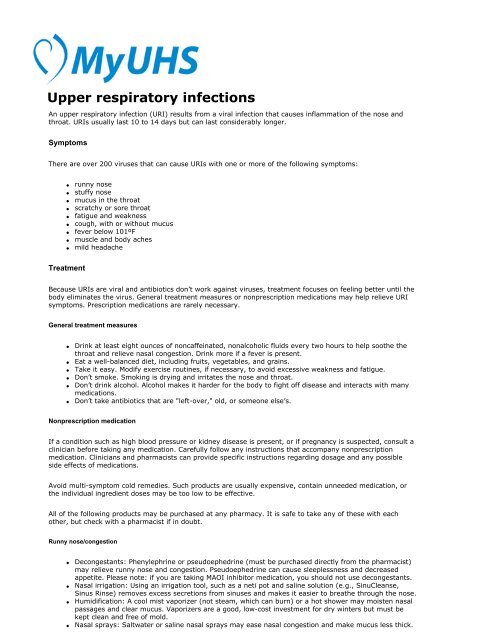
![Prescription Drug Formulary [pdf]](https://img.yumpu.com/51301099/1/190x245/prescription-drug-formulary-pdf.jpg?quality=85)
